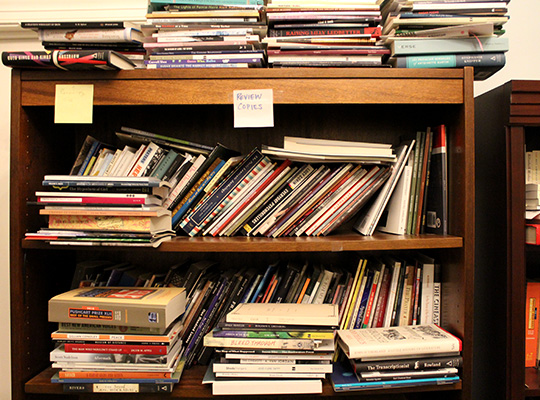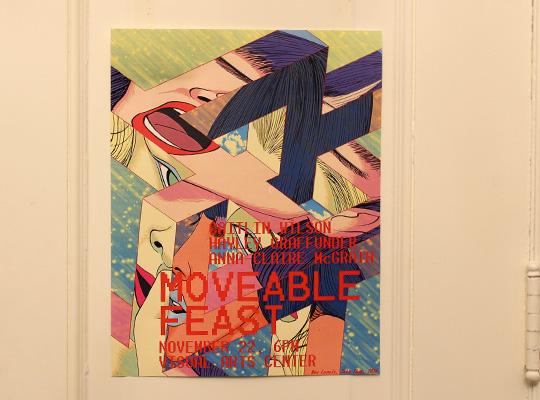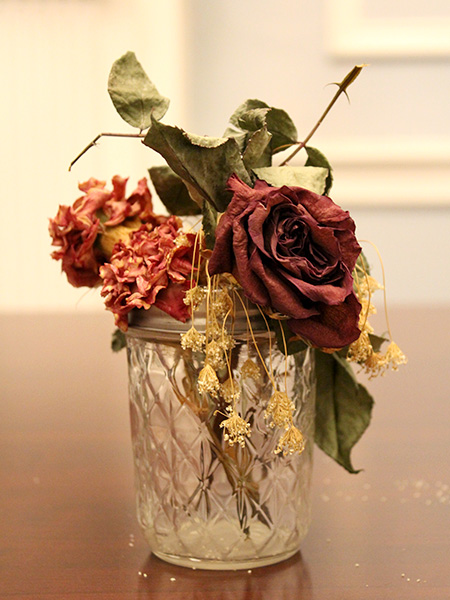 print preview
print previewback HAYLEY GRAFFUNDER
Managing Remotely: Blackbird in Pandemic
Before the pandemic, we operated out of three bustling rooms in Hibbs Hall at Virginia Commonwealth University, filled with interns and editors, notes on the walls, computers for pagebuilding, media editing, and research. Classrooms that, three days a week, held all the long quiet stretches, passionate discussions, chatter and laughter, and fast-typing fingers that go into making Blackbird.
Counterpart to this busy space is the Blackbird office, a small room in the historic Anderson House, used during normal times by the managing editor, managing editor emerita/us, and lead copy editor. Because it’s a Blackbird-only space, it houses all the physical odds and ends that a journal—even an online journal—collects. The kinds of things that must have seemed ordinary to those who worked in the space before me, who were immersed in the everyday routines of an in-person job.
 |
| Photo by Hayley Graffunder |
Today I came to the Blackbird office for the first time in nine months. My first time here was short, at the beginning of my tenure as managing editor, new to the job and excited for everything to come. I just wanted to see the space before campus re-populated and I hunkered down at my desk at home. And though I’ve rarely felt like I’ve missed out as the first, and hopefully only, entirely-remote managing editor—being here now, as my year in this role approaches its end, I feel the stifle of some lost experience, sealed off behind this door.
The room feels like a relic of another time, populated by things that highlight the lineage of this space, handed down each year to a new crop of student editors. Despite the distance these objects point out between now and then, they also give me a revived sense of how real this work is that we do.
On the mantel: a plaque that names Blackbird as the 2007 Richmond Magazine Editor’s Pick for Media Pleasure; a smattering of cards of the Christmas and thank-you varieties; a carved wooden blackbird, a cork from a champagne bottle, and an Edgar Allan Poe action figure, sealed in the package. Taped below this collection is a row of posters from Moveable Feast, the MFA program’s reading series for students, featuring names of past managing editors. The poster from my and Caitlin Wilson’s reading, in the Fall of 2019, hangs separately on a door, and still I am surprised to see it here—my only mark on this room made before I stepped foot in it.
 |
| Photo by Hayley Graffunder |
There are five bookcases for all the review copies, reference books, anthologies, and more, yet stacks of books teeter in more than one corner of the room. Among the actual useful things like stamps and staples, the desk drawers hold stories I can’t piece together of those who came before me. Pennies and dimes neatly separated into piles, no nickels or quarters to speak of. A single button in a bag labeled Calvin Klein. The kind of plastic ring found only on top of a cupcake.
And then, things that must have been useful at one time: floppy disks from before Blackbird's existence with labels like “Database Updates as of 08/31/95” and “Miscellaneous VCU—Office”; printouts on heavy cardstock of every Blackbird front page from 2002 to 2014; a printer that has sat broken for years because no one has really minded its brokenness.
 |
| Photo by Hayley Graffunder |
It’s a strange kind of collective memory that gets left behind in objects, at once physical and inaccessible. It’s somehow more ephemeral than the journal itself, with its sturdy archive and digital backups. It strikes me as incredible that the work we do remains live and accessible, and that in turn, I remain linked to my predecessors not through some space we shared, but the work we’ve accomplished: a publication history unbroken in its nearly twenty years.
Those of us who have had the privilege to make our mark on Blackbird can look back and see it from wherever we end up, whether we did that work in those three bustling rooms in Hibbs, in the office rife with beautiful, disjointed histories, or in our homes. Whether I leave a note on the whiteboard, or a dried rose in a jar on the desk, the work remains the same—a labor of responsibility, dedication, and above all, connection. ![]()